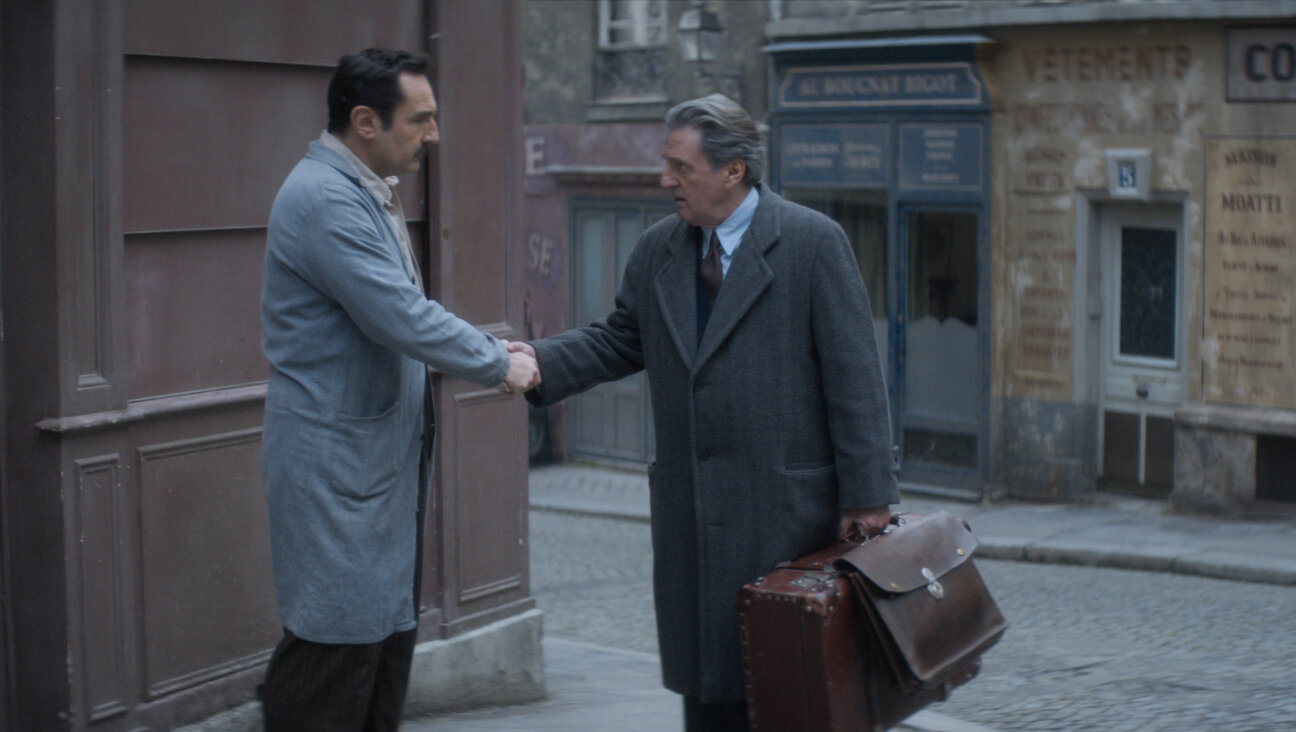What’s a Jewish song anyway — and how can you recognize one when you hear it?

Billie Holiday By Getty Images
Inspired in part by all the Jewish artists on Rolling Stone’s list of the 500 Greatest Songs, the Forward decided it was time to rank the best Jewish pop songs of all time. You can find the whole list and accompanying essays here.
What is a Jewish song? Is it one that connects you to the religion? To the culture? To the history? To a community?
Or is at a vaguer sensibility and philosophy in which spirituality is important, but the Bible is an interesting work of fiction? One in which the Holocaust is an important reminder not only of what happened to the Jews but of how hatred of any “other” needs to be strongly resisted as if all our lives depended on it?
To me, Jewish songs and Judaism itself, is a quest, but a quest without a grail or any other pot of gold at the end of it. One Jewish wag once rejected Buddhism by saying that “inner peace” was the last thing a Jew wanted. Ever skeptical, ever questioning, ever searching. You could say that a quest is a question, not an answer.
The songs on my list represent a personal sense of Jewish identity from a strong grounding in the religion and early sense of ethnic community to learning about the Holocaust and a much more skeptical attitude toward tribalism of all kinds.
Thinking of these songs in chronological terms, the first Jewish song I remember hearing wasn’t really a rock song but a 45 of Mickey Katz’s satire of Rosemary Clooney’s Italianate “Come On-a My House.” Katz’s Yiddish accent sent my brother and me into gales of laughter, reminding us of our less-assimilated family members. Instead of the seductive Clooney’s Christmas tree and Easter egg, so to speak, Katz was offering a knish and a matzoh ball, all to the beat of raucous klezmer music. In addition to the fun, looking back at it, the song was an unapologetic call for a seat at the table.
Pride in all things Jewish hit its zenith in 1961. While rock had taken over the Top 10, there were still intrusions from the pop world. Arnie “Woo Woo” Ginsberg counted down the hits on Boston radio on Sunday nights, and I would keep the radio going until the Mozart-meets-Mantovani sounds of Ferrante & Teicher filled me to the point of tears with the theme song from “Exodus,” written by Ernest Gold, who fled the Holocaust in Vienna with his parents.
Even then, though, I knew something was wrong when the lyrics came out a little later. “This land is mine / God gave this land to me” pretty much summed up the mixture of religion and nationalism I would come to despise in any form. Eventually I’d much prefer the inclusiveness of Bob Marley’s universal anti-oppression anthem “Exodus.”
Jewish pop and Broadway songs had a strong assimilationist strain — Irving Berlin’s “White Christmas” anybody? — and the one with lasting power is Leonard Bernstein and Stephen Sondheim’s “America.” “West Side Story” has come under criticism from the Latinx left, particularly for Anita’s lyrics in “America,” but Leonard Bernstein and Stephen Sondheim could have been writing about leaving the shtetl and European hatred behind rather than Puerto Rico.
Since we’re talking about favorite rock songs, find the version by Natalie Cole, Patti Labelle and Sheila E. And while you’re at it, check out Aretha Franklin’s version of George Gershwin’s “It Ain’t Necessarily So.” Talk about Jewish skepticism: “The things that you’re li’ble / to read in the Bible / It ain’t necessarily so.”
Bernstein had a rabbinical strain even when he was writing a Christian mass. The same could be said for the fellow who changed his name from Zimmerman to that of a Welsh poet, but Bob Dylan still became the most important Jewish songwriter of the rock era, despite or because of the fact that his Whitmanesque Judaism contains multitudes.
If the Holocaust isn’t as important to Jewish identity as slavery is to African-American identity in the U.S., it’s still there in critical ways. For Jewish liberals the lesson of the Holocaust is that ethnic oppression should be fought wherever it rears its head, and Dylan in his early songs joins hands with African-Americans and sings songs of Old Testament scourges to be visited on the oppressors, as in “When the Ship Comes In.” One of the hands he joined was that of Joan Baez, who could go from a Jewish song like “Donna, Donna” to “Oh, Freedom” without missing a beat. Abel Meeropol’s “Strange Fruit” shares the same commonality between Jewish suffering and black suffering — not a rock-era song by Billie Holiday, but Nina Simone and Nona Hendryx made it one.
Another post-Holocaust question was: How could God allow such misery to exist, particularly to followers? You can hear the resultant skepticism in “Highway 61 Revisited.” But the reason I chose “Like a Rolling Stone” as No. 1 on my list is that Dylan sounds more like a rabbi than ever in that lamentation. He could be davening as he sings about how the traditional answers don’t work any longer. He is as much without a home or temple as the person he’s singing to. Today he says the one true religion is music, which is the subtext of his most recent album, “Rough and Rowdy Ways,” and the music on my list reflects a similar inclusiveness.
Leonard Cohen traveled a more JewBu path, but he was still a master of skepticism mixed in with wonderment, particularly in the magisterial “Hallelujah,” which of course isn’t the religious anthem some would wish it to be but the story, filled with Old Testament references, of a cold, broken and lonely hallelujah. His spirituality is centered on the mystery of life, not the certainty. Jewish theologians can endlessly debate whether there’s a Jewish version of heaven or not; Jewish skeptics tell us to forget all that and imagine a world without heaven or hell and form a brotherhood of man, so saith the mentshiest of the Beatles, John Lennon.
Some great Jewish songs dwell on the silence of God, like Simon & Garfunkel’s “The Sound of Silence.” But the more mystical side of Judaism prefers to just “Let the Mystery Be.” Or as Lou Reed put it, you can’t depend on religion, but you need a busload of faith to get by.
The great rock Holocaust song is Kinky Friedman’s “Ride ‘em Jewboy,” a song one might think is ironic until listening to the haunting but not hopeless lyrics about Holocaust victims and survivors. Nelson Mandela reportedly listened to the song every night for the last 17 years of his incarceration.
Which brings us to one other aspect of Judaism — affirmation. There has been much written lately about conservatives being happier than liberals because they find joy in their religious communities. Perhaps there’s a lesson there in not throwing the baby out with the gefilte fish. You know, people who need people, etc. Before the pandemic I went to a wedding in which the klezmer band Shirim (a mixed-religion band) had everyone up and dancing to “Hava Nagila” — the wildest, most joyful version I’ve heard.
I couldn’t make it through the whole thing, but as I was watching the celebrants it was clear that every single breath they drew was Hallelujah.
Former Boston Globe television and theater critic Ed Siegel is critic-at-large and founding editor of The ARTery at WBUR in Boston.
Join us at 7:30 PM on Wednesday, Feb. 16, for a spirited discussion of the Greatest Jewish Pop Songs of All Time featuring Forward contributing editor and author Seth Rogovoy; executive editor Adam Langer; former Vibe and Spin editor-in-chief of Vibe, Alan Light; DJ and SirusXM host Hesta Prynn; novelist and screenwriter Jennifer Gilmore; and Forward contributing music critic Dan Epstein. Register here:
A message from our Publisher & CEO Rachel Fishman Feddersen

I hope you appreciated this article. Before you go, I’d like to ask you to please support the Forward’s award-winning, nonprofit journalism so that we can be prepared for whatever news 2025 brings.
At a time when other newsrooms are closing or cutting back, the Forward has removed its paywall and invested additional resources to report on the ground from Israel and around the U.S. on the impact of the war, rising antisemitism and polarized discourse.
Readers like you make it all possible. Support our work by becoming a Forward Member and connect with our journalism and your community.
— Rachel Fishman Feddersen, Publisher and CEO





























